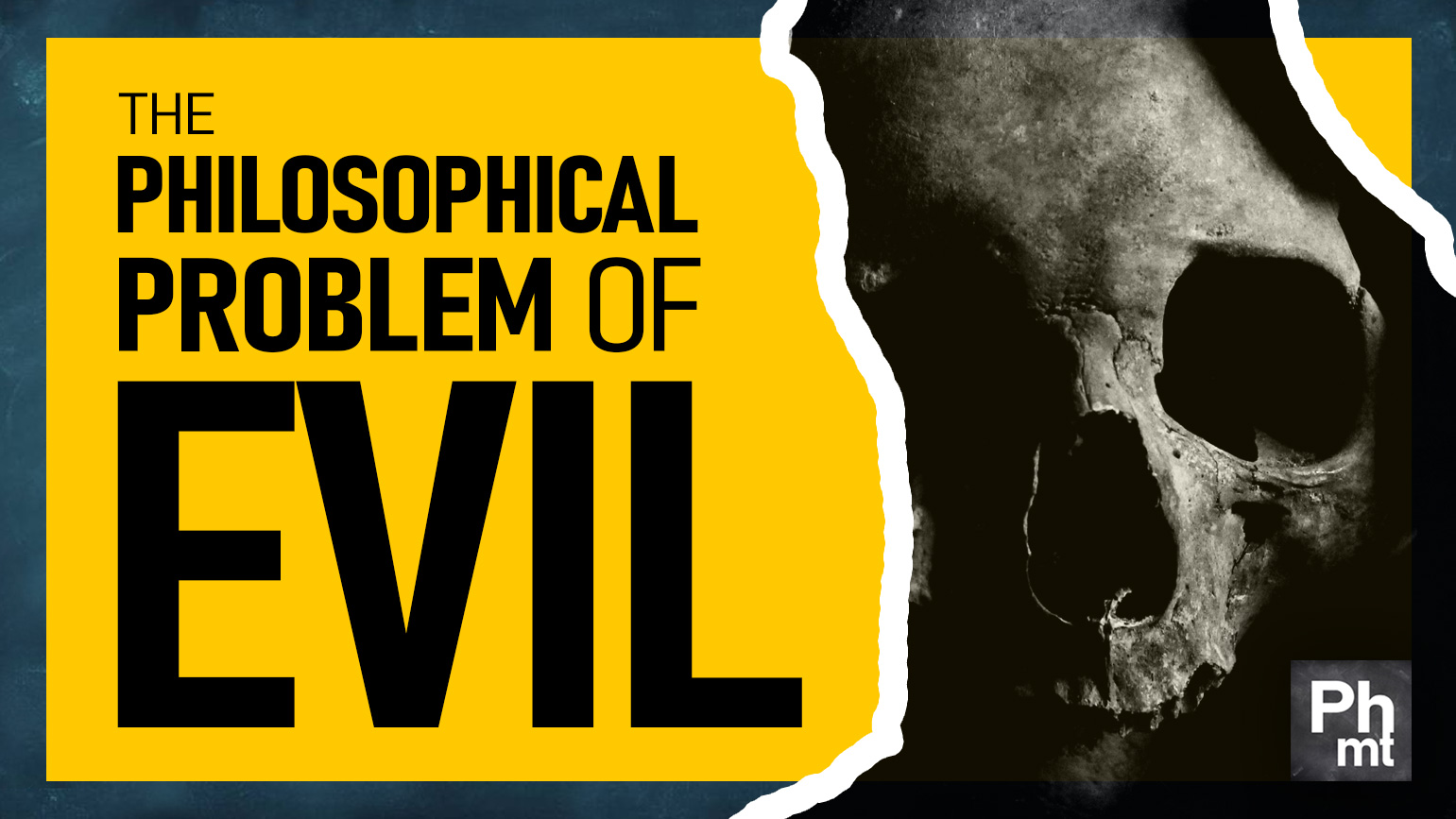Is God evil? An overview of the problem of evil
God is all-powerful. God is all-good. God is the creator of everything. And, at the same time, some very bad things exist.
Howcome, in the same universe supposedly created by this pre-eminently good God, do we also find Adolf Hitler, Mexican cartels, and Jack the Ripper?
Why is it that young children get leukaemia; innocent people lose everything in earthquakes and tsunamis, including loved-ones; and unwitting towns get indiscriminately buried and suffocated under hot ash spewing from an angry volcano, as when the infamous Vesuvius left up to 16,000 dead in 79 AD, or when Mount Tambora killed 100,000 people in 1815?
Didn’t God create the universe and everything in it? Given that he (or she, or it) has absolute power, couldn’t he have created a better place, one without suffering?
These questions outline what is known as the problem of evil. The existence of God the perfect creator seems paradoxical when there is so much that is horrendously wrong with the world.
Now, this problem seems to disappear if we were to accept that God either:
a. doesn’t exist, or,
b. doesn’t really care, or,
c. has an equally powerful and evil antagonist with whom he’s locked in an endless, cosmic tug-of-war.
Let’s start with the first two. God doesn’t exist, or if he does, he doesn’t really care.
It is estimated that the Jewish Holocaust cost the lives of around 6 million European Jews. That number doesn’t count political dissidents, homosexuals, people with disabilities, and others. In Auschwitz alone, more than a million people were exterminated in the most horrific ways imaginable, causing untold suffering. Survivor Primo Levi, an Italian-Jewish chemist, partisan, and writer, succinctly summed up the sentiment of countless Jews and others: “Auschwitz exists, and so there cannot be God.” Indeed, Hannah Arendt points out that Nazi officials exhibited a new kind of evil, one that normalised wickedness and carried out such horrifying acts as genocide, mass rape, forced labour, and widespread murder to the point where they became mundane. Atrocities weren’t even committed exclusively by only one side. It is estimated that in six years, the Second World War cost the lives of up to 50 million people. In view of all this evil, claiming that God doesn’t exist, or that, if he exists, doesn’t really care, does not seem that far-fetched.
Zoroaster and cosmic dualism
Let us look at the third option: that there are, in fact, two equal, opposing forces. This sort of cosmic dualism is closely associated with the ancient Persian mystic, Zoroaster, six centuries BC.
Zoroaster maintained that in the cosmos, or the ordered universe, there are fundamentally two opposing gods at work. One is good and just, giving life and harmony. The other is evil and unjust, dealing out death, destruction, and disharmony. On the one hand, we have love; on the other, hate.
These two gods, always opposed to each other, explain the duality of the universe and all our positive and negative experiences therein. Good versus evil, each as powerful as the other, constantly at odds. Sometimes it goes one way, sometimes the other.
Epicurus and the God paradox
Things, however, get a bit problematic when one side is given the quality of unlimited power. We have a term for this sort of divine supremacy: omnipotence. Omni– is a prefix that derives from Latin, meaning of all things. Potency means, quite literally, power. Therefore, an omnipotent being has the power to do anything.
Epicurus is attributed with having raised the problem in the 3rd century before Christ.
Let’s say that, when we claim that God is perfect, we are implying:
- that God is omnipotent. It is within his power to do anything; nothing is impossible.
Now, if an omnipotent God were somehow evil, one can argue that anything good that we perceive is just mischief on God’s part: giving us false hope and, ultimately, making our falls even harder. A bit like buying a child an ice cream only to scoff it away from them as soon as they’re about to take the first bite: “Ha ha! Gotcha!”
However,
- the claim is that God is also benevolent. Even better, he is omni-benevolent. God is perfectly good throughout. No shadows of any kind. He is pure, white light.
How can we reconcile the existence of evil and suffering with such an all-powerful, all-loving God?
Based on these divine attributes, we run into Epicurus’s problem:
First, if God is unable to prevent evil, then he is not omnipotent.
And second, if God is unwilling to prevent evil, then he is not benevolent.
Take a second to let that sink in.
If God were truly omnipotent, he would be able to prevent evil. Why doesn’t he?
And if God were truly omni-benevolent, he would be willing to prevent evil. Again, why doesn’t he?
Is God, if he exists, neither able nor willing to stop evil from existing? If that were the case, we have scant reason to call him God.
Stoicism: and the problem of evil
A possible answer comes from the Stoics. They would argue that God, rather than a transcendent, all-knowing entity, is immanent, meaning God is immersed in nature itself.
Good and evil are relative: we cannot know good if there is no evil with which to contrast it, much as we cannot know what light is unless we also know darkness.
The world itself is neither good nor bad, neither pleasurable nor painful, the Stoics claimed. Nature is rational and morally indifferent. Our awareness and judgement of it, however, are not. This is where our own power and control comes in. What we have control over, in an otherwise amoral world, is how we think rationally about it.
Unhappiness and evil are the results of human ignorance. For the Stoic, nature provides objective reality. This means that, in nature, there are such things as universal truths. When we live according to these universal truths, then we are living a life of virtue, aligned with nature. We live a life of virtue by being rational, acting according to reason, the way nature meant us. Evil is the result of ignorance of such universal truths. It is the result of when we are not rational.
Therefore, the solution to evil and unhappiness would be to ensure that we do not stray from nature’s universal reason.
Stoicism shone for about six centuries throughout the Greek and Roman world, and then, when Christianity became the state religion in the 4th century AD, it suffered a decline.
Augustine’s City of God: Light and dark
Around the time Stoicism declined, Augustine of Hippo, commonly known as Saint Augustine, would emerge as an important theologian and philosopher and a great influence on the development of Western philosophy and Western Christianity. Born in Roman Algeria, he was the son of a pagan father and a Christian mother. After leading a life of pleasure that included rioting, stealing, and fathering a child, he converted to Christianity at the age of 33.
For Augustine, God is the highest good. To think of God is to “attempt to conceive something than which nothing more excellent or sublime exists.”
God has perfect power, perfect knowledge, and is morally perfect. Every good thing is created by God; no good thing, great or small, can exist except by divine will. While everything within the created cosmos changes, God alone is unchanging, transcendent, lying outside and beyond the created universe. He is unchangeably good and truly eternal.
Therefore, Augustine provides a hierarchy of being, which he adopts from Neo-Platonist philosophy. At the top of this hierarchy there is God, another name for Plato’s Form of the Good. He is perfection itself, the supreme being, or unchangeable spirit.
Everything that exists reflects different degrees of being, emanating from this unchangeable spirit.
Close to the unchangeable spirit, but having a lesser degree of being, we find the changeable spirit. This is our spirit; it is what we refer to when we talk of souls and minds. It is also separate from the body.
Lastly, there is the material body, which still emanates from God, but is not spirit, and therefore it is the furthest removed from Supreme Being.
Still, everything that exists emanates from God. Then how is it that evil exists?
Here is where Augustine provides what is called the free-will defence.
According to the free-will defence, evil exists because we have free will, which is something given to us by God, and therefore it is, in itself, magnificent. Free will allows us to forge our own paths and make our autonomous choices.
Those choices have moral weight if the options themselves have moral weight. So, for example, choosing between an apple or a grapefruit is a choice, all right, but in most circumstances can be hardly considered a moral choice. On the other hand, choosing not to steal, or not to act violently without provocation, or to be charitable, are moral choices. We can choose to act either morally good, or morally evil.
We are morally better persons for choosing to act morally good, or benevolently. In spirit, we would be orbiting a bit closer to Supreme Being, closer to God. And that gives us meaning. So, given the NET BENEFIT of free will, even though, at times, it brings about suffering because of moral evil, it is still better than not having free will at all.
The free-will defence doesn’t lack objections.
For one, it only deals with MORAL EVIL, and does not address natural evil.
In the created universe, nothing is perfect. There exist natural things that cause UNTOLD, seemingly unjustified SUFFERING, things such as earthquakes, illnesses, floods, draughts, famine, and accidents.
There is nothing we people do to cause these things to happen. Nor, for the most part, is there anything we could do to avoid this suffering. They are types of evil that we find in nature and are not the result of bad choices on our parts. Somehow, God still lets them happen.
Therefore, while the free will defence may address moral evil, it does not seem to address natural evil.
The traditional religious answer to that would be that natural evil is the result of an evil supernatural being, sometimes called the devil. In contrast to Zoroaster’s evil being, Augustine’s devil was created by God in the form of an angel with free will. He then rebelled against his creator, out of his own will. In doing so he brought evil into God’s created universe, including the world. Natural evil would then be the effect of the Devil’s actions. This way, natural evil becomes a type of moral evil: the sinner being the devil himself.
Saint Augustine offers another take on the notion that free will does not address natural evil. His answer is rooted in the book of Genesis, and it runs something like this:
Natural evil is the result of the moral evil of human beings. Adam and Eve’s choice of disobeying God resulted in the fall of mankind. All the suffering in the world is a result of that original sin. It is the result of the corruption caused by Adam and Eve of something that was perfectly good into something wherein evil resides.
Two objections come to mind to these explanations.
The first one is based on the assumption that the devil’s rebellion or the fall of mankind were not actual events in history, but rather religious myths. Since they didn’t really happen, then free will cannot be the cause of natural evil. For instance, we have overwhelming evidence that there was suffering long before the appearance of the first human beings. Think of the great extinction event of 65 million years ago, which wiped out a wide range of species, including the dinosaurs. It is estimated that more than 75% or more of all species on Earth vanished, many of them after great suffering. Moreover, intense suffering is not only limited to exceptional events like this; it’s a daily occurrence. Think of diseases, injury, parasitism, starvation and malnutrition, dehydration, weather conditions, killings by other animals, as well as psychological suffering.
Second, it seems unfair. Even if we were to assume that the fall had been an actual event, why would innocent animals and children suffer as a result of a choice made by two people a very long time ago? In a just society, it would be considered unfair to punish the children for the wrongful acts of their parents. We would expect God to know and behave more fairly.
Aquinas’s Theodicy, evil as privation
800 years after Augustine, another towering figure of the Church and Western Philosophy would grapple with the problem of evil. St Thomas Aquinas attempted to synthetise Aristotle’s philosophy with principles of Christianity. In particular, he attempted to bring together Aristotelian eudaimonism – about which you can watch a video here – with principles of Christianity.
God is goodness itself. Goodness is not some property that God has. Neither is it something that exists independently of God. Rather, Aquinas argues, “the Good is what everything desires.”
Following Aristotle, Aquinas says that an act is good or bad depending on whether it contributes to, or deters us from, the proper goal for us humans. That goal, or, to use the Aristotelian term, telos, or final cause, is eudaimonia, or flourishing.
For Aristotle, achieving eudaimonia requires a range of intellectual and moral virtues that enable us to understand the nature of happiness.
Aquinas believes we can only achieve complete or final happiness when, not only have we become virtuous, but we have also united supernaturally with God, which is something that will not happen in this life.
Then, what is evil?
We can understand evil, Aquinas contends, when we understand goodness.
First of all, nothing can be totally evil, since when something exists, and since God is the creator of everything, then it has to have been willed into existence by God. Therefore, anything that exists NECESSARILY has some share of goodness. Thus, everything in existence has, at the very least, the property of existence itself which is good, or at least better than non-existence.
Absolute evil would then be the lack of existence. In other words, nothing that exists can be absolutely evil. The claim that something or someone were totally evil would be an oxymoron.
Remember the analogy, earlier, between God and pure white light? The further away from a source of light we go, the darker it gets. But darkness itself is not a thing or an entity; it is simply the absence, weakening, or PRIVATION of light. Similarly, Thomas Aquinas’s theory of evil as privation, following both Aristotle and Augustine, explains evil not as an entity, but, rather, as the absence, or privation, of good.
Leibniz’s theodicy: we live in the best of all possible worlds
In the 18th century, Leibniz theorised that our universe is the best possible one that God could have created. We live in the “best of all possible worlds.”
His argument, in simple terms, runs like this:
God, in his infinite wisdom, has the idea of infinitely many universes. However, we know of only one universe that exists, and we happen to live in it.
We also know that God is absolutely good and always acts in the most perfect and most desirable manner possible.
Moreover, God’s choices are subject to the principle of sufficient reason. That is, nothing that God does happens by pure chance; there is always an explanation.
Therefore, the universe that God chose to create is the best of all possible worlds.
Leibniz’s theodicy championed optimism in its unshakeable conviction that, in the long run, all apparent horror and misery are conducive to happiness and satisfaction.
Considerable objections didn’t take long to start pouring in.
A few years after Leibniz published his theodicy, the capital city of Portugal, Lisbon, was devastated by an earthquake that killed up to an estimated 50,000. It would be a harsh counter-example to Leibniz’s “best of all possible worlds.”
The illustrious Voltaire would compose his Poem on the Lisbon Disaster, considered one of the most savage literary attacks on the optimism of Voltaire. The amount of suffering contained in the world is just too great to allow such consolation.
Voltaire would go on to include a parody of Leibniz in the character of Dr Pangloss, in his comic novella Candide. Facing suffering, wars, illness, abuse of power, personal misfortune, and natural catastrophes, Pangloss stubbornly always finds some improbable justification. He goes the way of the ostrich, deludedly repeating Leibniz’s famous saying like a mantra.
Furthermore, like Thomas Aquinas before him, Leibniz also maintained that existence is by definition good. This point in particular would be picked apart by Bertrand Russell, who would argue that it is illogical: if existence were intrinsically good, then the mere existence of evil would require that evil also be good. Absolutely bad choices wouldn’t really exist and moral dilemmas would be false dilemmas. Yet, the whole premise of moral choice seems to rest on evil existing and being, obviously, evil, and on us having the capacity to choose good over it.
Alvin Plantinga: what would God do?
A more contemporary attempt to reconcile evil with the existence of God is by Alvin Plantinga, an American philosopher born in 1932. With a background in philosophy of religion, epistemology, and logic, Plantinga furthers a free-will defence to explain evil, by appealing to logic.
First of all, he redefines God’s omnipotence in terms of what is logically possible.
For starters, logical consistency would be an attribute of God. A round square would be logically inconsistent. 2 and 2 can never add up to 5. God, even being omnipotent, could not create things that are logically inconsistent. Likewise, he could not have created a world with free creatures who never choose evil.
Moreover, it is possible that God, even in his omnipotence, would want to create a world which contains evil, if moral goodness requires free moral creatures. It is not possible to exclude the presence of evil in the world, if our discussion is to include free will and the moral good. Plantinga’s argument is a reworking of Augustine’s argument. The price for creating a world in which people are able to produce moral good, Plantinga argues, is creating one in which they also have the capacity to produce moral evil. Plantinga managed to show that a benevolent God and the existence of evil are not necessarily logically contradictory.
Finally, to close off, here are some other reactions to the Free Will defence.
The first is a reaction to Plantinga’s claim that the capability to do evil is fundamental to morally significant free will. We are what we are, autonomous beings with significant moral agency and value, because we have free will. That freedom gives our sort of being meaning.
However, according to classical religious doctrine, when we die, if we have lived a good life, we should hope to go to heaven. And when we do, we will somehow be changed so that we will no longer commit sin. We will become radically incapable of committing sin. We will become unconditionally, necessarily good.
This in itself kicks up a number of challenges.
For instance, If it’s possible to not possess morally significant free will and yet have an existence of great value, then it’s hard to justify God’s choice of creating people here on Earth with the capacity for rape, murder, torture, sexual molestation, and nuclear war. A less evil world that is still capable of hosting an existence of great value seems to have been a possibility, after all.
Furthermore, if those who end up in heaven do possess morally significant free will, then it seems that it would have been possible for God to make us have moral significance AND necessarily always do what is right.
A second reaction to the free will defence would run like this:
God himself seems to be incapable of doing anything wrong; it doesn’t seem like he can make, or even can want to make, a morally bad choice. And yet, the proponents of the free-will defence argue that the ability to have that choice is fundamental for moral significance. If we were to maintain this line, then it seems that our greatest and most supreme example of moral significance, God himself would ultimately be the primest example that we are stating a contradiction.
Further reading
The following provide further reading material on the problem of evil.
- Thomas Aquinas. On Evil
- St Augustine of Hippo. City of God; Confessions; and On the Nature of Good
- Gottfried Leibniz, Essays of Theodicy on the Goodness of God, the Freedom of Man and the Origin of Evil, 1710; The Monadology, 1714, and Causa Dei
- J. L. MacKie. The Miracle of Theism, 1982
- Alvin Plantinga. Good, Freedom and Evil, 1973
- Bertrand Russell. A Critical Exposition of the Philosophy of Leibniz.
- Catherine Wilson. “Leibnizian Optimism.” The Journal of Philosophy, vol. 80, no. 11, 1983, pp. 765–83. JSTOR, https://doi.org/10.2307/2026020. Accessed 27 Aug. 2022.
Please subscribe to stay notified with fresh philosophy content.




